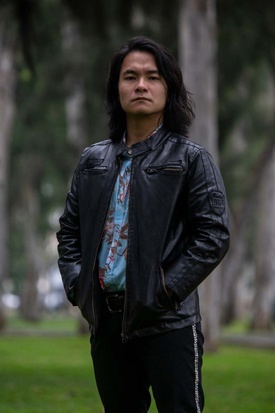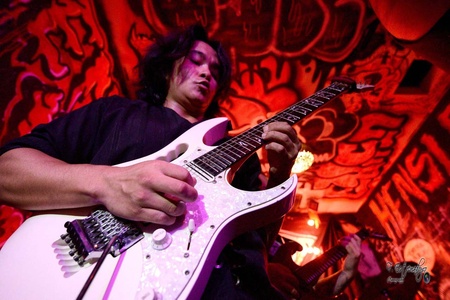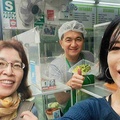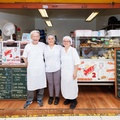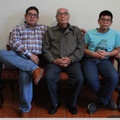“I think I inherited my grandfather's rebellious streak. His family made fun of him, because he wanted to be a broadcaster. He told me that he escaped from the farm on a bicycle, to go to Lima and see transistors, electronics courses, etc., even though they told him 'why are you going there, if you have to stay and take care of the farm?' . Something similar happened to me. ' You have to be here on the radio' . And until now I am still in the radio, which I also like, but not as much as playing the guitar and creating music.”
—Pepe Irei Diez Canseco
Pepe Irei Diez Canseco is a guitarist, radio producer and, furthermore, he would be the only Nikkei who literally has music in his blood. He is the grandson of the first Nisei broadcaster and remembered by La Hora Radio Japonesa, Don Shozen Irei, and son of the charismatic Pepe Irei of Radio Bacán. How was your passion for rock born, if your grandfather spread Japanese music and now your father does it with cumbia and folklore? Peru Shimpo spoke with Pepe Irei, the rocker who thrills with his mastery of the electric guitar and memories of obaachan.
* * * * *
This is the obvious question. How did you get interested in rock?
It was because of my dad, who has a rocker streak. I always saw him playing bass. My musical vein also comes from my paternal grandmother. She played piano and had a karaoke room. He made me sing enka when I was little, even though I didn't know its meaning. He said that I had “the makings of a singer,” although I am not attracted to singing.
Why did you choose the guitar?
Actually, I wanted to play bass like my dad did, but he wanted me to learn to play guitar first. I was 14 years old and I wanted to be the bassist in my friends' band. I practiced all day and downloaded videos and tablatures from internet booths, all so my dad could teach me how to play bass! Until he told me the truth: “in this house, there can't be two bass players.” So, since I had already fallen in love with the guitar, I chose to be a guitarist.
Did you only learn from your dad?
When I had a private teacher, I already knew how to do guitar solos. While at San Ignacio, a professor thought that I only enrolled in his course to show off. But it was Raúl Fernández Dávila López, who now lives in Spain, from whom I learned a lot.
Did you specialize in rock?
I play rock, rock and roll, blues, traditional heavy metal, AOR or adult-oriented rock, some jazz and anime covers.
A rocker who loves jazz and anime?
Jazz reminds me a lot of the enka that my grandmother made me sing. Unlike Western music, traditional enka, J-rock or anime do not have a flat structure, because they can skip the intro, come in straight with a chorus, etc. I quite like Tokusatsu anime songs from the 80s.
What artist influences your music?
They are Seiji Yokoyama, Ritchie Blackmore, Marty Friedman and Misora Hibari.
Seiji Yokoyama uses electronic sounds and rock instruments and his influence is so great that today's youth use parts of his compositions in memes. He composed the themes for Saint Seiya or Knights of the Zodiac.
I was so obsessed with guitarist Ritchie Blackmore's style in my early days that I played in a Deep Purple tribute band in 2008 and that was my professional debut. Furthermore, Misora Hibari exerts a strong influence on me to create melody structure, thanks to my grandmother who made me listen to it. And also the American guitarist Marty Friedman, who is already another “nihonjin”, because he lives in Japan, speaks Japanese and has a presence in Japanese music.
Have you created themes in Japanese?
All the melodies I have composed have parts of Japanese song structures or Japanese sounds mixed with rock, like Kibō and Melanchophony .
Kibō (hope in Japanese) begins with an attack of shamisen, which is actually the electric guitar. It has melodic passages like jazz and a slow interlude like a lullaby that takes me back to my childhood with my grandmother.
Melanchophony combines melancholic melodies (melancholy) with symphonic cuts (symphony). It doesn't have specifically Japanese sounds, but the melancholic melody through the symphonic cuts reflects what I learned from Seiji Yokoyama.
What inspires you to create?
The melodies I make are like showing my psychological profile, my life experiences. Just like life, in music there is part tension and part hope. I like to be optimistic despite situations.
What bands have you played in?
I can mention Strangers (Deep Purple Tribute), Steph Red as a solo artist and with his band RED, Jefferson Tadeo, Metal Crucifier, Revlin Project and now, Fallen Symmetry, where we are currently working on an album.
What has been your most memorable concert?
When I played with Joe Lynn Turner (2016). The videos of that presentation went around the world because of the clothing I wore, including a wig. It was memorable because I was a guitarist for a singer that only I saw on DVD or VHS and because I showed my family the fruit of my effort. Another memorable event was Mark Bowles.
How does this pandemic affect us?
Economically speaking, I don't see online concerts working, although they do work as an exhibition showcase. In this pandemic, there are two versions of a musician: the musician who gave up and the musician who saw this opportunity [of the pandemic] to reinvent himself and continue developing, like I am doing. I know that it is complicated due to the situation, but I believe that there is a way to find solutions to continue moving forward despite the difficulties.
Did you take your gap year?
Yes, I decided to continue training as a musician. Next year I will be 20 years old playing electric guitar. At the same time, I run my program “Barrio Metal” on Sundays on Radio Bacán and my YouTube channel about guitar tutorials and anime covers. Additionally, I do virtual electric guitar classes.
Tell us about the classes.
They are electric guitar classes for all ages, levels and social strata, from 14 years old. If you want to become a professional musician or learn to play a song for your girlfriend, this is an open proposal. The only requirement is to have a guitar at home, patience and determination.
Is it difficult to be a musician here in Peru?
Working and living from music is complicated here. There is informality, sometimes unfair competition, there are store owners who choose whoever charges less to reduce costs, there are people who don't have much talent but take the place of those who do.
Are there Nikkei artists dabbling in anime?
I haven't seen Nikkeis at anime events, unless they have some Japanese ancestry that isn't visible. The only “nihonjin” would be the guests who arrive from Nihon. I hope this isn't taken as a negative review, but the market here is a bit informal. There are musicians who only sing anime because they like it, they know the lyrics back and forth and they sing it in Japanese without even understanding the meaning; but they do not have the purely Japanese style or the inflection, which is very marked and different from the Western one. It is not enough to just like something to do it, but you also have to do it professionally and demonstrate musical quality.
PEPE IREI DIEZ CANSECO
Facebook: @pepeireiguitar
Instagram: @pepeireiguitar
Youtube: Pepe Irei
Ko-fi: PepeIrei
* Article originally published in the Peru Shimpo newspaper on September 1, 2020.
© 2020 Milagros Tsukayama Shinzato / Peru Shimpo


